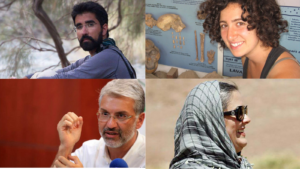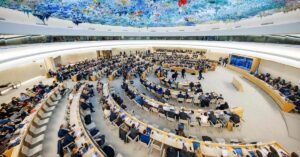
گامی به سوی عدالت: آزادی فعالان محیط زیست در میان نگرانی های حقوق بشری
در مسیر مبارزه برای حقوق بشر در ایران ، آزادی سپیده کاشانی و طاهر قدیریان از زندان اوین در روز سه شنبه ۲۱ فروردین، لحظه
We’ve created this action hub to track everything happening on the ground and the actions we’re taking here at home to support them. We recognize that this is a defining moment for our community and we are moved by the bravery, resiliency, and courage on display for the international community.
NIAC stands with the Iranian people and supports their aspirations for their rights, dignity, and fundamental change. Combat misinformation by reading more about our policy stances below.
Read More: Where NIAC Stands and Has Always Stood
Learn More: Visit NIACTruth.org
These events have demonstrated why it’s so important that we have focused, relentless, organized advocacy that helps our loved ones on the ground. That’s why NIAC is redoubling our work to educate the public, organize our members, and ensure that U.S. policymakers take actions that uplift the cause of human rights and dignity. Here’s what you can do to help.
Read our latest reports on human rights as protests continue in Iran and across the world. Sign up for NIAC’s Human Rights Tracker emails to get these reports in your inbox.

در مسیر مبارزه برای حقوق بشر در ایران ، آزادی سپیده کاشانی و طاهر قدیریان از زندان اوین در روز سه شنبه ۲۱ فروردین، لحظه

برای خواندن این مطلب به فارسی اینجا را کلیک کنید In a development that shines a light on the continuing struggle for human rights in

The United Nations Human Rights Council has renewed its commitment to scrutinizing human rights practices in Iran by extending the mandates of both the Special
NIAC condemns the violent crackdown on protesters and continues to stand in solidarity with the people of Iran who have an unquestionable right to speak out against the injustices and repression they face. Don’t miss the latest updates from NIAC’s work for the Iranian-American community.
تا همین لحظه٬ دولت بایدن تایید کرده که یک رشته حملات تلافی جویانه انجام خواهد داد و این ممکن است طی چند روز آینده اتفاق بیفتد. این حملات شامل هدف قرار دادن پرسنل ایرانی در عراق و سوریه و احتمالا شخصیتها و تأسیسات سپاه پاسداران انقلاب اسلامی خواهد بود.
در ۸ ژانویه ۲۰۲۴، خبرنامه The Alligator گزارش داد که دانشگاههای فلوریدا از دادن پیشنهاد استخدام در برنامههای کاری و پژوهشی به دانشجویانی که از کشورهای چین، ایران، کره شمالی، کوبا، ونزوئلا و سوریه هستند منع شدهاند.
Where do the various legislative initiatives stand at this critical juncture? Congress has returned to work amid continued conflict and turmoil in the Middle East. While some voices in Washington continue to push for outrageous escalation, including calling for bombing Iran, those with level heads are working to end the horrific war between Israel and Palestine and prevent conflict from boiling over into full-blown regional war.
Support NIAC’s work by making a tax-deductible contribution today.